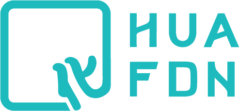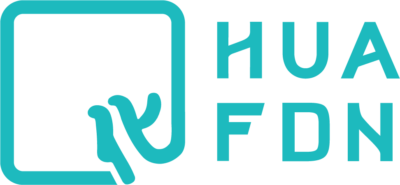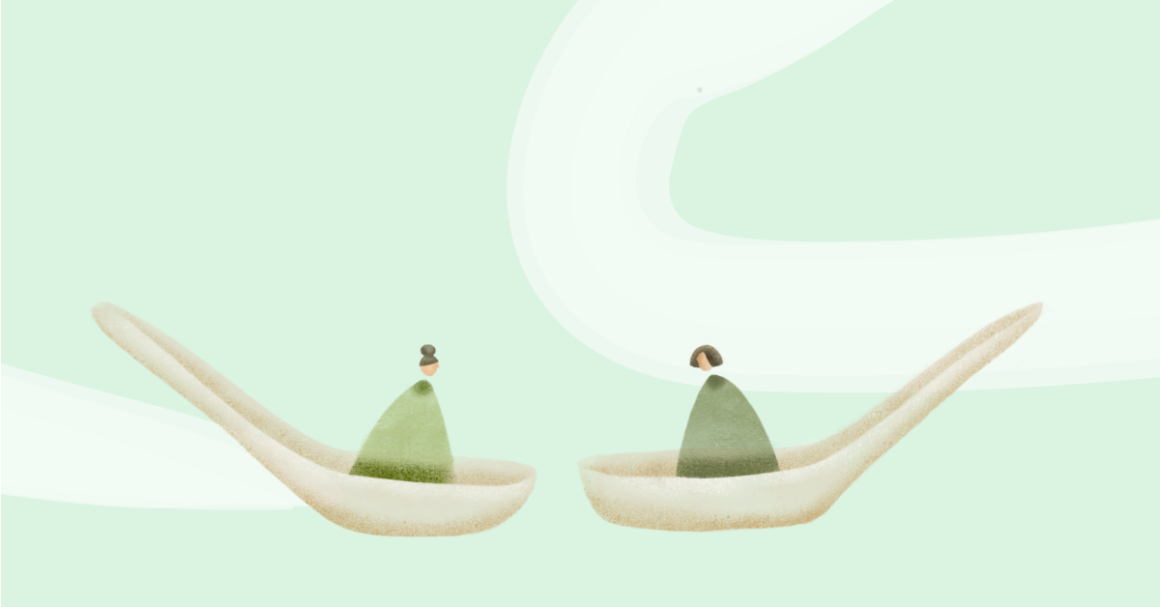As an organization, hua foundation has been engaging in an exciting period of growth over the last few years. Earlier this year, we embarked on a journey to expand our board of directors and we are excited to welcome Crecien Bencio, Joanne Li 李亚君, Jessica Wang 王衍華, and Yara Younis to the team! This week for Asian Heritage Month, they are sharing some reflections and aspirations for their upcoming term on the hua foundation board, based on conversations facilitated by kevin and christina. These interviews have been edited for clarity, and brought together in conversation here.
Crecien Bencio
I’m Crecien (he/him), and I’m a queer Filipino settler. I grew up learning how to be creative and curious in my community, whether that’s a community kitchen, or co-learning how to make a recipe with peers, or listening to people’s stories. Through this, I was able to get a beautiful picture of how life can be really vibrant; experiencing life through flavours and places and memories is what has guided my own path to learning and my drive to creativity.
What are your aspirations for this work?
My commitment at the age of 28 is to feel creative every day. Some days that’s quite a struggle, whether it’s showing up to a job where we don’t feel creative, or feeling like it’s hard to dedicate the time to our creative interests. In my community work, I ask myself questions like, how can I volunteer my time and use my skills to still feel creative, and get my juices flowing both when I’m doing an art project and when I’m in front of a computer?
When we think about organizational creativity and nonprofit creativity, what I like to see, and what signals to me a spark of creativity is open-mindedness. To have imagination and to have the flexibility to pivot, and to have a lightness to the organization is a talent. There are a lot of organizations that do projects that are repetitive, but what I want to see is organizations that address the deep issues and drive systemic change. Often we get stuck in administrative work and sometimes it takes an artist to curate that experience, one that sparks imagination and perks ears.
What does Asian Heritage mean to you?
When I think about my heritage, I’m constantly reminded of absence, which has been sorrowful for a lot of my life but I think as an adult, and as an artist, I think about what can be created from absence, what can be created from the not-knowing, and what can we create from my parents’ Filipino Indigenous culture. How can their principles of community be applied to the place where we have settled?
We often think of heritage as something that mines the past or as a memorialization of the past, but what I find exciting is seeing young Filipino people rediscovering their Indigenous roots and making something new of it: whether that is music or dance or art, and a lot of that being intangible forms of culture and art. I’m always guided by this idea that heritage is not about seeking things in the past or the memorialization of the past, but what we are making of the future. I think that really opens a lot of opportunity in spaces or relationships of absence, that it’s not always about longing for what we don’t have but also recognizing creative agency to create something new.
Joanne Li 李亚君
I’m Joanne Li (she/her), and I’m a settler of colour, and a designer and researcher for the public sector in my day job. I also run Ignite the Warmth, I dabble in the arts (some recent ventures include silversmithing and linocutting), and have been a long time fan and lurker of hua foundation and the people who have been and come through the organization.
What are your aspirations for this work?
I love a good dreaming question! This is where the dissonance of working within institutions comes in. I feel like my capacity to dream has been stunted so much from bureaucracy and pragmatism. It’s a muscle that I have to rework, and that’s definitely one of my personal hopes for joining this board.
There are so many possibilities but my gut instinct is to question, what am I coming into this space as: perpetuating harm or perpetuating help? Not that these exist in binary, but so much of what I’ve learned from starting a nonprofit, and as a researcher, as a public servant, a lot of those have been lessons in perpetuating harm. Holding this tension, what does it look like to set up accountability frameworks for one another, for communities, for the work that we’re accountable to and the communities that we’re in service to, and to create that collectively is really exciting and invigorating for myself.
We can hold each other up, and as I like to say, systems are only made up of people and mindsets, and it’s easier to influence one person than an entire immovable entity or an idea of a system.
What does Asian Heritage mean to you?
It’s tough! For me, when I think about heritage and culture, it’s rooted in pain, and isn’t as celebratory. There are a lot of disjointed and disconnected parts of myself with my past, and my histories, and my culture. It just feels like I can’t properly celebrate in that identity or celebrate in this community that often feels unfamiliar.
Those histories are constantly being written as we experience how our identities have shaped and continue to shape us, so there’s pain and there’s hope in knowing that there isn’t a permanence to my definition of heritage. But I think the more we challenge how we’re supposed to feel or act, we’re reclaiming our choice to participate in this arbitrary month, outside of how it aligns with hashtags or what’s ‘trending.’
It’s so important to have the safety to articulate those pains, to address for example, what does it mean to engage with your past when it’s severed, and can we still find space to grieve during a month of celebration?
Jessica Wang 王衍華
I’m Jessica Wang (she/her), and I’m a second generation Taiwanese immigrant to what we call Vancouver. In my professional life I work as a consultant, and in my personal life, I’m a sister, a daughter, and a general nuisance to others, and I guess now a new board member to hua foundation, which is exciting to say!
What are your aspirations for this work?
One of my general goals is to help nurture others. By nature I really enjoy helping other people learn and grow. I have a lot of experience taking part in this kind of mentorship work, both with children and youth, and with older adults.
One of my really formative experiences was during my time with the Immigrant Services Society of BC (ISS of BC), where I had the opportunity to be paired with an older Mandarin-speaking auntie, in a language exchange. Through that experience, I learned that providing nurturing environments for adults is not too different from a child. Just having that openness and curiosity, and recognizing the humanness in it all.
I think it also speaks to this craving for cultural safety. As a kid, I felt very visible, as soon as I walked into a room, and I surrounded myself with friends who also had similar experiences, even if I didn’t understand why at the time. Even in my professional life now, my closer coworkers are ones that I feel like I share identities with.
Creating these spaces of trust and co-learning are a huge part of my own learning process, and while there is no perfect solution for education, nurturing these types of spaces for curiosity is something I’m really interested in.
What does Asian Heritage mean to you?
To me, Asian heritage is more than what you see on the surface – it’s about the diverse experience we all bring and carry. Defining what Asian heritage means to me is nuanced and is still something I am seeking to understand.
I think of when young adults move out of their family home, and your parents visit for the first time, and it’s weird because it’s your space, but they’re your parents. How do you maintain that level of respect to your parents, and yet assert that this is your space, and your independence? It just feels like there is this constant tension between being a good daughter, but I’m also my own person, but what does my own person look like relative to all of these other identities that I hold?
As an adult now, and after having worked with elders with similar experiences to my parents, I have a deeper understanding of the ways that they struggled, that I didn’t quite understand at the time. For some things, it’s hard to see the resolution when you haven’t had the experiences yet.
Yara Younis
I’m Yara Younis (she/her) and I’m Palestinian and a refugee, and a settler on Coast Salish lands. I came to Vancouver to get my Masters degree, but also mainly to find stability for myself, to feel more secure as a stateless person, where I’ve spent most of my life so far as a person with very precarious status. It was interesting to learn about the ways that certain glaring issues manifest here, especially around race, and how specific communities are boxed in, which led me to explore what is happening in community. That led me to my current work, where a lot of my interests and passions for working with migrants of all different backgrounds and identities overlap.
What are your aspirations for this work?
One of the things that I’m interested in is to really address the tensions within our target communities, whether that’s prevalent anti-blackness, classism, and binary ways of thinking and being. I’m excited to create cross-community connections and collaborations, especially if the goal is to widen the scope of who hua foundation serves.
In my experience working with people in very different places in life, just trying to survive, or in precarious situations, they don’t care about your strategic plan or timelines, and it’s our role to adjust according to their needs and not impose. When it comes to having difficult or uncomfortable conversations, one of the things that has been really difficult to balance is, how do we invite conversation rather than shutting people out? Especially when it comes to acknowledging one’s privilege, even when we are often targets of oppression, we can also be agents of oppression for other communities. It’s really about being flexible and learning on the go, and understanding that things never go the way that you plan.
For me, joining hua foundation is more of a stepping stone of further grounding myself in the needs of community, and actually being in a position to support in some way. For most of my past experiences, I’ve been in the other position of hearing the needs of community in informal ways, but not so much in a position where I can actually do something for the long term.
What does Asian Heritage mean to you?
I wouldn’t say that I’m the perfect example of my heritage. I’m a very westernized person, but at the core are a lot of values that I grew up with, and a lot of those values stem from generations and generations of Arab culture. I choose to reject the ones that I don’t agree with and keep the ones that I think can actually enhance relationships with people.
The first thing is that my culture and my heritage is rooted in community, especially being surrounded by people all the time, which I kind of escaped, but I do miss it. When I’m here, I do feel like everything is my responsibility, or that I, alone, have to deal with issues, whereas when I was surrounded by community growing up, or with my family, I felt like I at least had someone to lean on, or I didn’t feel like I had to deal with things on my own; there was always someone that you could depend on.
And that might not necessarily be unique to my heritage, but it is how my grandparents and great grandparents grew up in a small village on the Gaza Strip, in Palestine. Everyone knew everyone and their kids, and that might feel a bit invasive, but they share food, they help each other, and they exchange knowledge and news. These are all informal systems of communicating that I think are really lacking here. Here, you only trust ‘credible sources,’ but a lot of my heritage is based on oral history, because a lot of that was erased, destroyed, or rewritten.
And so I’m a curious person, and that’s a big thing learned from my elders: they’re nosy, they want to know everything, but they want to know everything because they want to understand. Maybe they want to gossip too, but that’s how they learn from each other.


